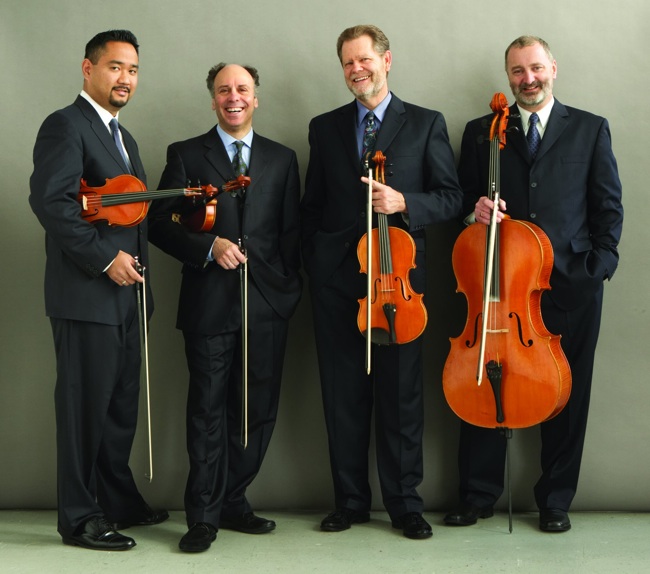School may have been in session last Saturday morning at Berkeley’s St. John’s Presbyterian Church, but the students clapped long and hard, something rarely heard just a few blocks north at UC Berkeley.
The lecturer, musicologist and composer Robert Greenberg, was assisted by the formidable Alexander String Quartet, which sat onstage to give musical illustrations throughout the lecture before playing their concert. And the “returning students” were an enthusiastic audience.
Greenberg waxed forth on the second string quartets of Béla Bartók and Zoltán Kodály, and of the friendship and remarkable ethno-musical exploration that the two composers embarked upon, with his usual humor and vehemence. “My friends,” he would slyly exhort the crowd, before delivering an over-the-top statement, like describing Bartók’s Allegro opening as “Hungarian disco inferno!”
Born just 20 months apart, the two Hungarian composers became fast friends, first as fellow musicians—Bartók mastering piano and Kodály the strings—then as fellow composers and finally as patriots of a Hungary that was fractured by political stresses. The two expressed their love for their homeland by travelling with Edison’s early cylinder recording device, capturing the folk music of the countryside, and transcribing those vigorous scales, modes and rhythms. That work, which went on to birth the science of ethnomusicology, is everywhere apparent in these two string quartets, tempered with the formal training of a German musical lineage. Also apparent in these works is the tempest during which they wrote, each completing their work in 1918, after three years of World War.
There was a sense of interaction, both with history and with a composer who was wrestling with culture, war and sonata form. Bartók was forward thinking, politically and musically, and had hoped that his far-ranging folk studies—as far as Turkey and North Africa—would promote a closer appreciation and thus foster peace. His was a life-long mission, so it was no surprise, after publishing anti-Nazi sentiments in 1940 that he had to flee for his life to the United States.
Greenberg described the three movements as lyric, dynamic and reflective, but those three adjectives hardly did justice to the austere lines, the raw power and demonic Magyar themes, or the bitter beauty of those movements. Above all, this was a brilliant re-working of the entire Western musical canon.
The Alexander String Quartet delivered the fierceness it deserved.
First violinist Zakarios Grafilo kept a chilled edge on Bartók’s high-arching themes, a sense of wind in a mountain pass, heightened by the low drone of the other strings. The Allegro dove low with intense bowing, village machismo, and forward thrust grace notes, inflected like the explosive Ugric language. The Lento was grievous, minor chords made bitter with Balkan dissonances. The first movement theme, broken down into paired intervals, reappeared here with slowly rising insistence, and then all was swept away by metallic harmonies, glassy as the God-harmonies of George Crumb’s Black Angels, which, like Bartók, promised our world a cleansing by fire.
After that, Kodaly was almost playful!
Cellist Sandy Wilson gave the quartet assurance and the deep resonance of a fine araq, while Paul Yarbrough added a golden baritone sound on viola. Completing their magic, second violinist Frederick Lifsitz labored hard in the trenches for little glory, but their sound would have been hollow without him.
This popular Saturday morning series continues with two more concerts and lectures, Dec 10 and Dec 17 at 10 a.m., featuring the last of the Bartok quartets. More information and tickets are available at sfperformances.org.
—Adam Broner
Photo below of Alexander String Quartet, from left: Zakarios Grafilo, first violin, Frederick Lifsitz, second violin, Paul Yarbrough, viola, and Sandy Wilson, cello.

